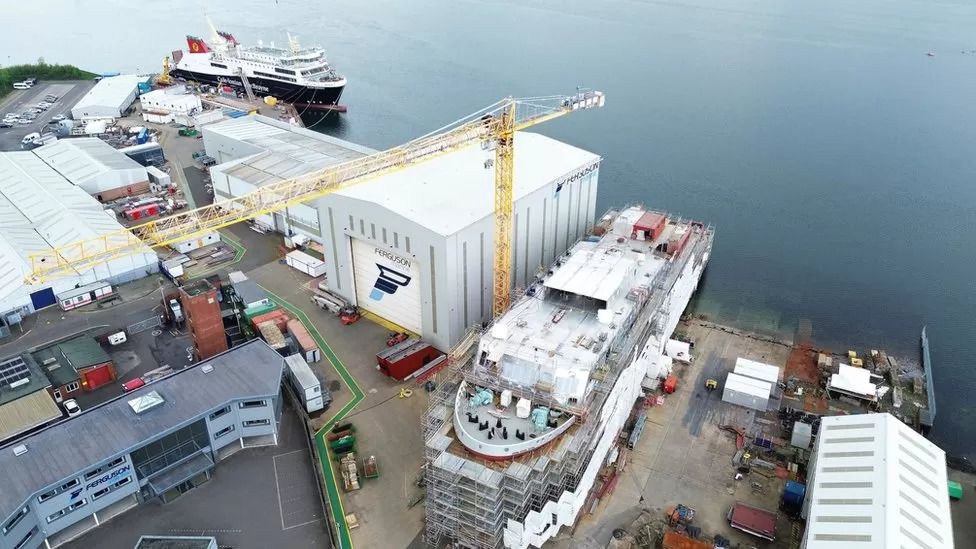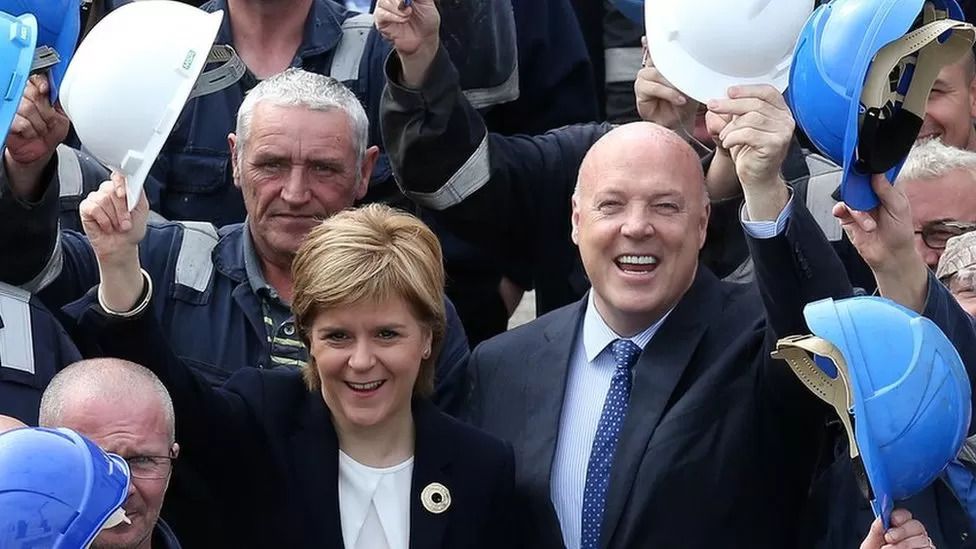
Former Ferguson shipyard boss offers to buy it back for £1
Jim McColl said the second of two overbudget CalMac ferries being built at the Port Glasgow site should have been scrapped four years ago.
He blamed a flawed concept design and interference by state-owned ferries agency CMAL for delays and extra costs.
CMAL has insisted the problems stem from "catastrophic contractor failure" during Mr McColl's time in charge.
On Tuesday, the Scottish government revealed it would be cheaper to order a new ferry elsewhere rather than complete Hull 802 at the nationalised shipyard.
But Welfare Economy Secretary Neil Gray has given a ministerial instruction to continue funding, because the alternative would mean further delays to securing extra ferry capacity.
Mr McColl, who rescued the Ferguson shipyard from administration in 2014, said it was the right decision from "a moral standpoint" because it protected the workforce, but from a commercial perspective it made no sense.
He told BBC Radio Scotland's Drivetime with John Beattie: "They've really dug a big hole for themselves here. They've messed up big time since they took that yard over - and the innocent victims here are the workforce.
"Commercially it's absolutely the wrong decision but it's a tough one because of the human cost involved. But they've created the problem with the human cost and they are going to have to fix it."
 Hull 802 and Glen Sannox are still under construction at Ferguson Marine shipyard
Hull 802 and Glen Sannox are still under construction at Ferguson Marine shipyard
The businessman claimed the problems encountered in building the ferries stemmed from an "inadequate" concept design that was not "properly thought through" by CMAL.
He said it would have made more sense to scrap the second ship, Hull 802, after the yard was nationalised in 2019, and start again with a more conventional vessel.
Mr McColl's company Ferguson Marine Engineering Ltd (FMEL) was awarded the £97m contract to build the two ferries in 2015, and the ships were meant to enter service three years later.
But relations between FMEL and CMAL broke down after the yard presented a demand for extra costs, on grounds of unforeseen complexity and repeated design changes by the ferries procurement agency.
By 2019, construction had ground almost to a halt and the shipyard was nationalised after going into administration again.
Asked if he would consider buying the shipyard again Mr McColl said: "I would take it back for £1 and they would need to give me two years' worth of costs so we could keep the workforce there while we built up new orders."
He added that he did not expect the Scottish government to take up his offer.
 Nicola Sturgeon visited the shipyard when the contract for two new ferries was awarded to Mr McColl's firm in 2015
Nicola Sturgeon visited the shipyard when the contract for two new ferries was awarded to Mr McColl's firm in 2015
CMAL said it did not wish to respond to his criticism, but it has previously accused Mr McColl's company of failing to deliver on what was a "design and build" contract.
In a submission to MSPs earlier this year it said: "CMAL consider that the primary cause of the vessels' delay and associated cost overrun is a catastrophic contractor failure between October 2015 and August 2019".
The current Ferguson Marine chief executive David Tydeman has blamed previous "management and build errors".
When Mr McColl's company FMEL went into administration in 2019 it was asking for an extra £66m to complete the ships, over and above the original £97m contract price. He was also pressing for an independent expert evaluation on the merits of his claim.
After nationalisation the government-appointed "turnaround director" Tim Hair said an extra £110m would be needed to finish the vessels.
This estimate for extra costs has since risen to more than £200m, with the first vessel, Glen Sannox, due for delivery this autumn and Hull 802 in late 2024.
A spokesperson for the Scottish government said: "When we took Fergusons into public ownership in 2019 we did so to ensure the delivery of 801 and 802 and to secure the future of the yard and its workforce.
"We did this because of the vital significance of the vessels to our island communities and the yard and its workforce to the local, regional and national economy."
The government intends to return Ferguson Marine to the private sector "when the time is right and when there is the right offer", the spokesperson added.











